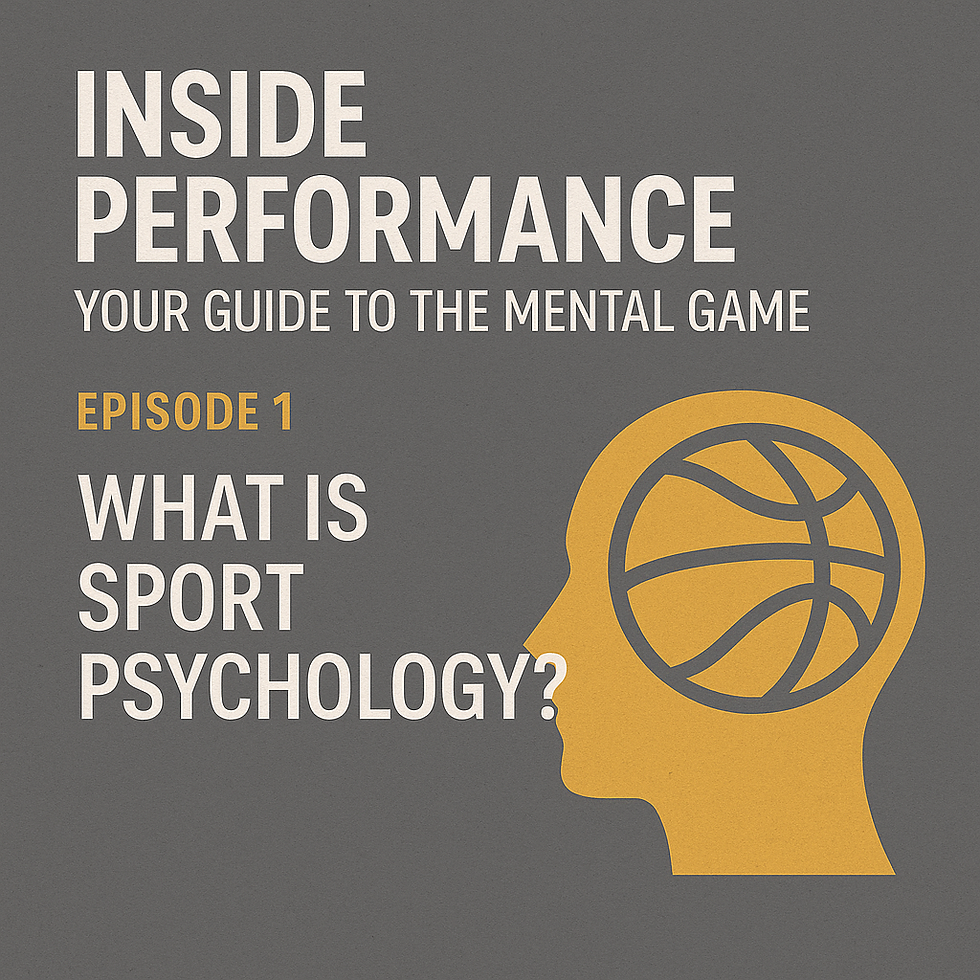🧠 The Benefits of Sport Psychology: An Integral Piece of the Performance Jigsaw
- Dylan Rodgers
- Nov 4, 2025
- 4 min read
Understanding how the mental side of performance supports both excellence and wellbeing.
Sport psychology is a fascinating and growing field that explores the mental and emotional aspects of performance. It looks at how psychological factors influence athletic success and how participation in sport impacts overall wellbeing.
For athletes looking to elevate their performance or overcome mental barriers, understanding the value of sport psychology can be a game-changer.
Performance in sport is complex. It is influenced by many interconnected factors — physical, technical, tactical, social, and psychological.
The mental side is not a replacement for these other areas, but it is an essential piece of the performance jigsaw.

Enhancing Performance Through Mental Skills
Many athletes face mental barriers that can hold them back from performing at their best. Nerves, self-doubt, and lapses in focus can all interfere with performance, particularly under pressure.
Sport psychology helps athletes develop the skills to manage these challenges. Techniques such as visualisation, mindfulness, relaxation, and attention control are used to create a focused and adaptable mindset.
Research consistently shows that athletes who engage in structured psychological skills training (PST) improve both their performance and wellbeing (Weinberg & Gould, 2019; Mamassis & Doganis, 2004).
Deliberate mental training helps athletes perform more consistently and recover faster from setbacks.
Elite athletes often integrate these practices into daily training. A study by Weinberg and Williams (2010) found that imagery, self-talk, and goal-setting interventions led to measurable improvements in concentration, confidence, and performance.
Similarly, The Gold Medal Profile for Sport Psychology (Durand-Bush et al., 2022) identifies psychological skills such as confidence, resilience, and focus as key competencies for high performance.
These findings make one thing clear: the mind is not separate from performance — it is an active part of it.
Supporting Mental Health and Wellbeing
Athletes often face significant pressure to perform, which can take a toll on mental health. Stress, anxiety, and self-doubt can undermine both wellbeing and consistency.
Sport psychology provides tools to manage these pressures. Techniques from Cognitive Behavioural Therapy (CBT) help athletes identify and challenge unhelpful thought patterns, replacing them with more balanced, realistic perspectives (Beck, 2011).
Mindfulness and Acceptance and Commitment Therapy (ACT) approaches teach athletes to work with their thoughts and emotions rather than against them. These methods are strongly supported by research (Gardner & Moore, 2007; White et al., 2021; Henriksen et al., 2020), showing improvements in focus, stress management, and emotional regulation.
According to the NCAA (2022), around 30% of student-athletes report experiencing symptoms of depression or anxiety, highlighting the importance of psychological support.
By addressing both performance and wellbeing, sport psychology promotes a balanced, sustainable approach to development.
As Henriksen and colleagues (2020) emphasise, thriving environments prioritise both excellence and health — because when wellbeing is supported, performance follows.
Building Resilience and Confidence
Resilience is one of the most valuable qualities an athlete can develop. It helps athletes navigate the highs and lows of sport — the injuries, losses, and moments of self-doubt that are part of every career.
Sport psychology helps build resilience through reflection, self-awareness, and deliberate coping strategies.
Goal-setting is one of the most effective tools for this. Research shows that setting specific, challenging, and process-focused goals improves motivation and satisfaction (Weinberg & Gould, 2019; Locke & Latham, 2002).
Another powerful factor is mastery and preparation. Confidence built on personal progress and consistent preparation is far more stable than confidence based on outcomes or comparison (Vealey, 1986; Feltz, 2007).
Resilient athletes don’t avoid challenges — they see them as opportunities for growth. This growth mindset (Dweck, 2006) helps them adapt, persist, and perform more effectively under pressure.
The Role of the Sport Psychologist
Sport psychologists work with athletes, coaches, and teams to strengthen the mental component of performance. Their role includes assessment, intervention, and education — all tailored to the individual’s context.
They help athletes:
Build self-awareness and reflection.
Develop mental skills like focus, confidence, and emotional regulation.
Manage stress, setbacks, and transitions.
Balance performance and wellbeing.
These interventions are grounded in evidence-based frameworks such as ACT, CBT, and Psychological Skills Training (PST). They are not one-size-fits-all solutions but collaborative processes that help athletes become self-sufficient and self-aware performers.
As Gould et al. (2002) found in their study of Olympic champions, the athletes who reached the highest levels were not just talented or hardworking — they were reflective, adaptable, and mentally committed.
Why Sport Psychology Matters
Sport psychology is not just about enhancing performance; it is about supporting the person behind the performer.
When athletes develop awareness, manage emotions effectively, and stay aligned with their values, performance naturally improves.
It provides the missing link between physical training and optimal performance — helping athletes perform with confidence, resilience, and purpose.
Because when the mind is trained and supported, the rest of the puzzle starts to fit together.
🧩Research-Informed Summary
Weinberg & Gould (2019) – Psychological skills training improves performance consistency and focus.
Durand-Bush et al. (2022) – Self-awareness, confidence, and resilience are core mental performance competencies.
Gardner & Moore (2007); White et al. (2021) – ACT and mindfulness enhance focus, wellbeing, and performance under pressure.
Gould et al. (2002) – Olympic champions demonstrate strong psychological skills and reflection habits.
Henriksen et al. (2020) – Balanced high-performance environments support both wellbeing and excellence.
Locke & Latham (2002) – Goal-setting is one of the most effective motivators of sustained effort.
Vealey (1986); Feltz (2007) – Mastery and preparation are the strongest and most stable sources of confidence.
✏️Final Thought
The mental side of sport is not separate from performance. It is part of the foundation.
When athletes invest in their mindset, they invest in their consistency, resilience, and long-term wellbeing.
That is what sport psychology is all about.



Comments